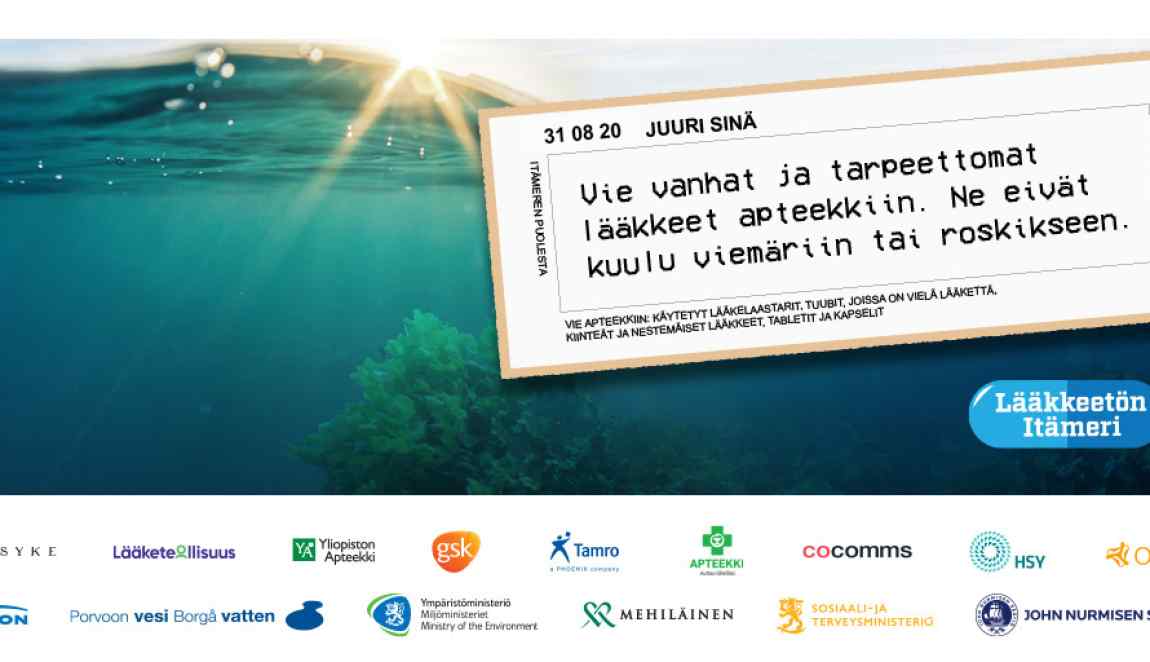
Old and unnecessary drugs should be returned to a pharmacy. They do not belong in the sewer or trash. Organised for the third time, the Drug-free Baltic Sea campaigns encourages consumers to recycle drugs at pharmacies. The reminder is needed as according to a recent consumer survey, many still dispose of drugs in ways that are harmful to the environment. Tamro is one of the campaign’s main partners.
Finns still have room for improvement in the recycling of old and unnecessary drugs. According to a consumer survey* conducted by Kantar TNS Oy for the Drug-free Baltic Sea campaign, 18% of Finns dispose of drugs in the sewer, toilet or trash.
– Correct disposal of drugs is important for the environment. Residues from drugs that end up in the sewer or trash cause unwanted hormonal effects and behavioural disorders in organisms and result in increased resistance to antibiotics in the environment, says Taina Nystén, Leading Expert at the Finnish Environment Institute.
Return transdermal patches to pharmacies
Solid and liquid medicines, tablets and capsules, used transdermal patches and tubes that still contain medicine should all be returned to a pharmacy. The survey found that only 30% of Finns are aware that used transdermal patches should be recycled at a pharmacy along with other drug waste. Most commonly recycled medical waste are old and unnecessary tablets and capsules.
– After a few days of use, a transdermal patch can still contain up to half of its drug contents. For this reason, it is important that they are recycled along with other drug waste.” Patches should be folded with the adhesive sides together before recycling, says Sanna Siissalo, PhD, Expert Pharmacist at the Association of Finnish Pharmacies.
The consumer survey also investigated why Finns find it important to recycle old and unnecessary drugs at a pharmacy. For 30% of Finns, protecting the environment and recycling were the main reason for returning drugs to a pharmacy.
Tamro is involved in the campaign for the third time
The Drug-free Baltic Sea campaign encourages all Finns to take action to protect the Baltic Sea and other waterways. An easy and tangible way to protect the environment is to recycle old and unnecessary drugs at a pharmacy. They do not belong in the sewer or trash as they may end up in the environment or in the hands of children, for example.
– The Baltic Sea is particularly sensitive to man-made pollution. There is strength in working together, and we challenge every company and individual to take steps towards a healthier Baltic Sea and environment. Innovating together and challenging traditional ways of thinking do not require great sacrifices. Our everyday choices make a difference. Together, we can do this!, says Katja Toivonen, Quality and Corporate Responsibility Manager at Tamro.
This year’s campaign is organised by communications agency Cocomms together with GSK, Helsinki Region Environmental Services Authority HSY, Pharma Industry Finland, Mehiläinen, Oriola, Orion, Porvoo water, Yliopiston apteekki and the Ministry of the Environment. Experts in the campaign are the Finnish Environment Institute SYKE and the Association of Finnish Pharmacies. The patron for the campaign is the John Nurminen Foundation.
Checklist: How to dispose of drugs the right way
1. What drugs should I recycle at a pharmacy?
Used transdermal patches, solid and liquid medicines, tablets and capsules, and tubes that still contain medicine should be returned to a pharmacy.
2. How do I recycle drugs?
Remove tablets and capsules from their packaging and put them in a see-through bag. Put creams and aerosols in the bag in their original packaging. Remove the prescription sticker. Leave liquid drugs in their original bottle and put them in a separate bag. Fold transdermal patches with the adhesive sides together before putting them in the bag. Remove prescription stickers from plastic and cardboard packaging and recycle them separately. Return all plastic bags to a pharmacy.
Always return the following in a separate bag:
- drugs containing iodine
- cytostatic drugs in their original packaging directly to a pharmacy staff member
- syringes and needles packed in a non-see-through container. The container can be a bottle or jar, for example. Ask your local pharmacy for instructions on how to dispose of insulin syringes.
- mercury thermometers
3. What don’t I need to recycle at a pharmacy?
Products such as cosmetic creams, dietary supplements and natural products do not need to be recycled at a pharmacy. They can be recycled with mixed waste.
Sources
Drug-free Baltic Sea consumer survey 2020. Kantar TNS Oy, 2/2020, ages 15-79 N=1111.
www.laakkeetonitameri.fi
Facebook: Lääkkeetön Itämeri
Twitter: @Vieapteekkiin
Instagram: laakkeeton_itameri